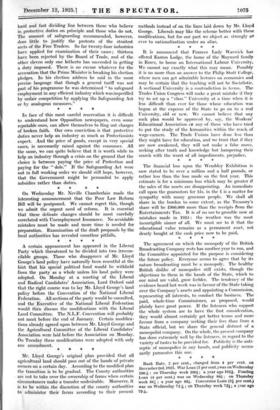The agreement on which the monopoly of the British Broadcasting
Company rests has another year to run, and the Committee appointed for the purpose is considering the future policy. Everyone seems to agree that by its nature broadcasting must be a monopoly. The healthy British dislike of monopolies still exists, though the objections to them in the hands of the State, which to our mind are valid, grow feebler. The tendency of the evidence heard last week was in favour of the State taking over the Company's assets and appointing a Commission, representing all interests, to conduct the business. The paid, whole-time Commissioner, as proposed, would plainly have great power. If the listeners who support the whole system are to have the first consideration, they would almost certainly get better terms and more favour from a company seeking their fees than from a State official, but we share the general distrust of a monopolist company. On the whole, the present company his done extremely- well by the listeners, in regard to the variety of tastes to be provided for. Publicity is the anti- septic of monopolies in any hands, and publicity neces- sarily permeates this one.






















































 Previous page
Previous page